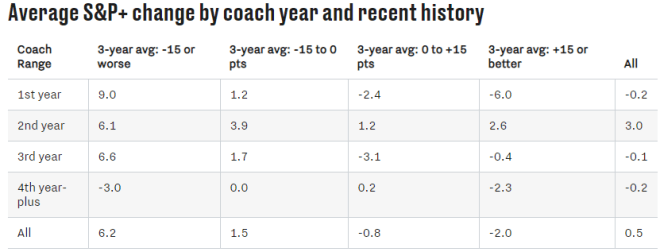The “sophomore slump” is a phrase we’re all familiar with. We heard it in undergrad after getting a 4.0 our freshman year before taking a deep dive into our major courses that ripped us apart (looking at you, macroeconomics). We heard it after Lamar Jackson’s dazzling finish to his freshman year and his heroics in the 2015 Music City Bowl.
But sometimes the slump never comes. It never came for Lamar. And based on advanced analytics, it typically doesn’t come for college football coaches.
The last two years I have put together a piece showing how Louisville football coaches have followed similar trends for the last three decades. Based on UofL’s historical trends alone, Scott Satterfield is right on track to have a record identical to last season’s. After the program cratered under Ron Cooper, John L. Smith had a miraculous 7-5 first year turnaround followed up by… another 7-5 season. After Steve Kragthorpe leveled the program a decade later, Charlie Strong’s breakout 7-6 season was proceeded by a… 7-6 sophomore campaign. After Bobby Petrino left the program in shambles, Scott Satterfield jumped out of the gate with an 8-5 inaugural season, which probably means… you get it.
But while Louisville’s last 30 years have followed an almost perfect trendline, it’s still hard to buy too much into numbers from a single institution over a period of decades in which the sport has evolved at a breakneck pace.
To gauge a more accurate prediction of what Year 2 may look like under Scott Satterfield, we must nerd it out. And who better to get our geek on than with the college football robot himself, Bill Connelly.
Mr. Connelly is the inventor and proprietor of the SP+ analytics system for college football, which for you new folks is an advanced analytical rating system that helps rank and predict the performances of teams based on a variety of efficiency measures. Think of it as the KenPom of college football, for you basketball junkies reading this. Using the numbers his computer has generated, Bill has done pretty significant research into the successes of second year head coaches and the numbers are encouraging.
Between 2008 and 2018 Connelly observed that coaches in their first years experienced an average change in their SP+ rating by “minus-1.03, with a minus-0.12 average change in win total. By Year 2, the average change was plus-2.59 (plus-0.87 win total). In Year 3, the average change in SP+ rating was plus-1.44 (plus-0.26 win total).”
In Year One Scot Satterfield improved Louisville’s SP+ rating by over 9 points, taking the team from -9.1 (that’s bad) to 0.2 (that’s not bad). For reference LSU’s rating was a 33.1 and dead last UMass’s was a -34.6. So a 0.2 is about as middle of the road as things get. Satterfield also raised Louisville’s win total by a staggering 6 wins.
Furthermore, Connelly explains that “over those 10 years, 70% of second-year coaches enjoyed a win total at or above that of their first year and 63% saw their S&P+ rating improve (46% by at least three adjusted points per game, 17% by at least 10).”
All of these numbers point to UofL likely having a similar record, if not a better record, while continuing to improve their SP+ rating. Based on the schedule (iF tHeRe’S a SeAsOn), this makes even more sense. While the Cards should be improved once again, their schedule isn’t getting any lighter. So it’s certainly not hard to believe that Louisville can finish with 7 or 8 wins, even though they’re a better team than last year’s.
This is further supported by Connelly’s breakdown of how teams perform with new coaches in relation to what level the program is at that they’re taking over.

The chart is easy enough. If your team has been bad over the last few years, your new coach is probably going to make things better. If you’ve been average, you’ll likely stay average. And if you’ve been great, then you’ll likely regress. Louisville’s three-year SP+ average (2017-19) is a 3.4. This means in all likelihood Louisville should at least take another decent step forward. As Connelly said, “In your second year, no matter what, you’re probably going to improve.”
But by no means does a few points gained in the SP+ ratings translate to more wins. I think we should expect to see an improved Louisville team against a somewhat improved schedule. This should lead us to see bigger wins and closer losses as the team looks better overall, even if the record itself doesn’t reflect the improvement.
Want to nerd out with us? Join the conversation here: https://louisville.forums.rivals.com/threads/satterfield-due-for-sophomore-slump-or-bump.50720/